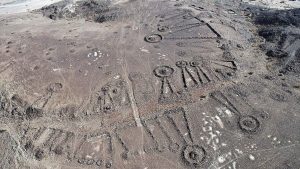 Published: 12 January ,2022: 09:51 AM GSTUpdated: 17 January ,2022: 12:09 PM GST
Published: 12 January ,2022: 09:51 AM GSTUpdated: 17 January ,2022: 12:09 PM GST
Archeologists have uncovered ancient 4,500 year-old highway-like roads in Saudi Arabia that date back to the 3rd millennium BCE where thousands of burial monuments surround the pathways, the official Saudi Press Agency (SPA) reported on Tuesday.
University of Western Australia (UWA) researchers determined that inhabitants of ancient north-west Arabia built long-distance ‘funerary avenues’ that linked oases and pastures, suggesting a high degree of social and economic inter-connectivity.
The findings were published in ‘The Holocene’ journal by the team working under the Royal Commission for AlUla (RCU).
The site was discovered and studied using satellite remote sensing, low altitude aerial photography, ground surveys, excavation and radiometric dating.
The task is being undertaken to “shed light on the lives of the ancient inhabitants of Arabia,” the SPA reported.
The study suggests that complex social horizons existed 4,500 years ago across a huge swathe of the Arabian Peninsula.
An important finding from the study confirms that the densest concentrations of funerary structures are located near permanent water sources.
The direction of the roads suggests that many of these pathways were used to travel between major oases, including those of Khaybar, AlUla and Tayma.
Archeologists discover 4,500 year-old ‘funerary avenues’ and burial monuments in AlUla. (SPA)
Other avenues fade into the landscapes surrounding the oases, possibly meaning that they were used to move herds of domestic animals into nearby pastures during periods of rain, according to SPA.
The UWA team’s work is part of a wider effort that includes 13 archaeological and conservation project teams from around the world collaborating with Saudi experts in AlUla and neighboring Khaybar regions within Saudi Arabia.
“The work done by our archaeological teams in 2021 demonstrates that Saudi Arabia is a home for top-flight science – and we look forward to hosting more research teams in 2022,” declared Amr al-Madani, CEO of RCU.
Projects similar to the UWA team’s work have been ongoing in AlUla for at least three years, according to Dr. Rebecca Foote, Director of Archaeology and Cultural Heritage Research for RCU.
“These articles are just the beginning of many publications that will advance our knowledge of prehistoric to modern times and have significant implications for the wider region,” added Foote.
The new article is the UWA team’s fourth publication in less than a year in a peer-reviewed scientific journal on research at AlUla and Khaybar.
Archeologists discover 4,500 year-old ‘funerary avenues’ and burial monuments in AlUla. (SPA)
In March of 2021, the team reported in the Journal of Field Archaeology that they had discovered the remains of the oldest known domesticated dog in Arabia.
A month later, in April, the team detailed in the journal Antiquity that the monumental structures known as mustatils are much older than previously believed, dating as far back as 5,200 BCE, and appear to have had a ritual function.
In August, in the journal ‘Arabian Archaeology and Epigraphy,’ the team dated the pendant-shaped tombs of Khaybar Oasis to the 3rd millennium BCE, marking the first article in a peer-reviewed journal regarding the Bronze Age in Khaybar.
The RCU has embarked on a 15-year working plan to “regenerate AlUla and parts of Khaybar as a leading global destination for cultural and natural heritage,” according to the SPA report.















